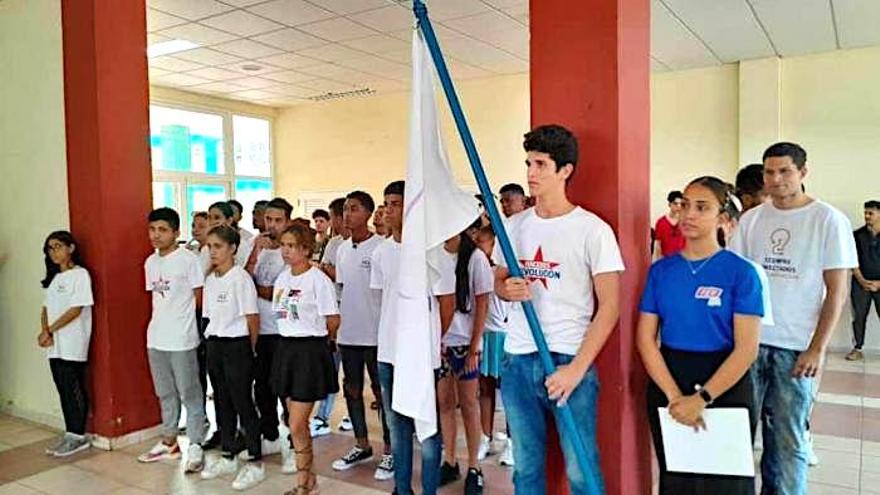
![]() With their fists held high and shouting slogans, on Wednesday the members of the University of Havana Energy Contingent received a mission from the authorities: to launch a campaign of “timely detection of illegalities,” monitor “residences, state and private entities,” and admonish – door to door – those who appear on the “list of high consumers” of the capital.
With their fists held high and shouting slogans, on Wednesday the members of the University of Havana Energy Contingent received a mission from the authorities: to launch a campaign of “timely detection of illegalities,” monitor “residences, state and private entities,” and admonish – door to door – those who appear on the “list of high consumers” of the capital.
The brigade, made up of members of the University Student Federation (FEU) and the Union of Young Communists, are under orders from the Electric Union (UNE) to “transmit a fresh message” of “energy control.” On Cuban Television, young people allowed themselves to be recorded entering homes, examining meters and filling out a thorough record of appliances to verify that the expense “that they are reporting to the Electric Company really corresponds to what they have in the houses.”
In their task, the young people said that they will not wait for “indications to act for what is fair,” and considered – in the words of Yanara Sosa, president of the FEU at the University of Havana – that they are carrying out a “transcendental process” whose rigor will not spare the “state or the residential sector.”
After this Wednesday’s “registration” of the contingent, its members will be distributed throughout several territories, although they will be supervised by the UNE offices in the capital. During the past month, similar activities have been carried out in other provinces of the country, where the universities have also formed brigades of student “inspectors.”
The University wants the contingent to effect a radical change in consumption and defines its work as “preventing” illegalities
In the case of the Central University of Las Villas (UCLV), one of those that first and most enthusiastically took on the task, the contingent is made up of students from the Electrical Engineering and Telecommunications careers, in addition to UNE workers. Its task: “planning the charges” – a cryptic expression that designates the comparison of what the consumer declares and what he pays, with special attention to the “new economic actors,” the province’s small private businesses.
Villanueva University hopes the contingent will effect a radical change in consumption and defines its work as “preventing” illegalities. The measure arrives at a good time, said the directors of the UNE, since Santa Clara is at the forefront of electricity consumption in the country, along with Havana.
As in the capital, the “registration” of the UCLV brigade also had ideological overtones, and its members were urged to carry out each inspection with an eye on the benefit that the “task” is lending to the Revolution. “The university is going to ’embrace’ the people,” said the dean of the Faculty of Electrical Engineering, Yunier Valeriano, to soften his speech on energy control.
Despite the enthusiasm of the Energy Contingent, Cuban university students have been the first to suffer the country’s electrical instability. The suspension of entire weeks of classes, the long delays in scholarships and the effects of transport are part of the student routine in all the provinces.
The brigade and the UNE speak of a resounding “crisis” but don’t mention at any time that Cuban ports continue to receive oil tankers or the lack of transparency of the Government about these operations. This Wednesday, for example, the Cuban tanker Delsa was anchored in the terminal of the Mexican state-owned Pemex, located in the port of Pajaritos, in the state of Veracruz. As reported to 14ymedio by University of Texas researcher Jorge Piñón, the ship “has already docked in the port” and is ready to “load crude oil,” which it will then transport to the Island.
The brigade and the UNE speak of a resounding “crisis” but don’t mention at any time that Cuban ports continue to receive oil tankers
The Government of Mexico has been involved in a controversy about the conditions of oil deliveries to Cuba, without clarifying whether they were donations, sales or barter. On Tuesday, the Mexican Undersecretary of Foreign Trade, Alejandro Encinas, assured that there is no such “commercial relationship” in the energy area with Cuba. The comment, offered during the Havana International Fair, contradicts the movement of oil tankers in recent months between the two countries.
According to data from the Energy Institute of the University of Texas, the Mexico sent about 750,000 barrels to the Island in October. From March to September, Mexico sent 2.8 million barrels to Cuba, valued at around 200 million dollars, according to the figures collected by the U.S. university.
Havana has never clarified where this fuel goes and why it does not contribute to alleviating the country’s energy crisis, which the UNE reports every day. This Wednesday, its official Facebook profile announced that at 1:00 pm a “shot” from the Renté thermoelectric plant in Santiago de Cuba left that province and Guantánamo province without electricity. So far, electricity has only been able to be restored “gradually.” The announcement, as usual, caused a flood of comments from disgruntled users.
None of these arguments, however, will be on the lips of the members of the University Energy Contingent, whose declared function is to monitor “compliance with the measures,” not to explain the inconsistencies of the Electric Union.
Translated by Regina Anavy
____________
COLLABORATE WITH OUR WORK: The 14ymedio team is committed to practicing serious journalism that reflects Cuba’s reality in all its depth. Thank you for joining us on this long journey. We invite you to continue supporting us by becoming a member of 14ymedio now. Together we can continue transforming journalism in Cuba.
